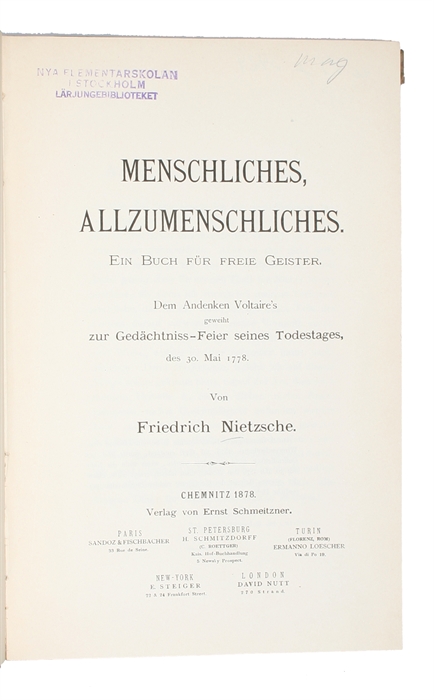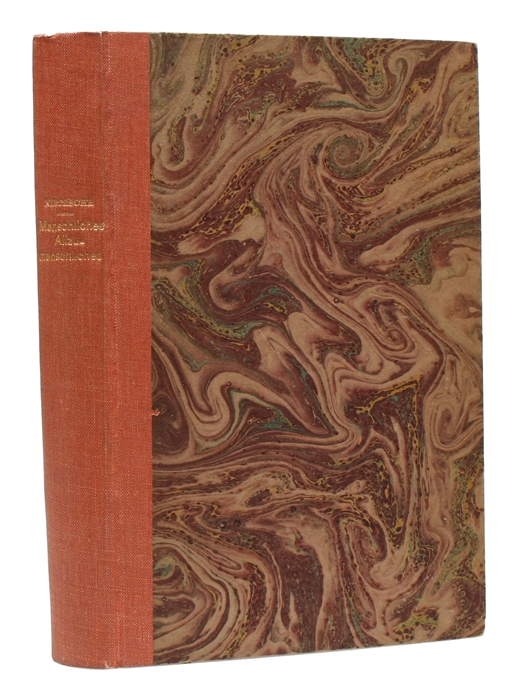NIETZSCHE: "MY MOST IMPORTANT BOOK"
NIETZSCHE, FRIEDRICH.
Menschliches, allzumenschliches. Ein Buch für freie Geister. Dam Andenken Voltaire's geweiht zur Gedächtnis-Feier seines Todestages, des 30. Mai 1778.
Chemitz, Schmeitzner, 1878.
Lex 8vo. Contemporary reddish-brown half cloth with gilt lettering to spine. Inner hinges weak and a tear to back hinge. Library-stamp to title-page and library-labels to back end-papers. Apart from that a very nice and clean copy, with the half-title, the advertisement-leaf and the "eere"-correction that was cut out and pasted in by Schmeitzner over "enon" of the word "menon" to spell "meere", on p. 290. (6), 377, (1), (2, -advertisements) pp.
The scarce first edition, first issue, of the work in which Nietzsche the philosopher comes into being, his seminal "Human, All Too Human", according to Nietzsche himself, his most important book, by many considered his first actual philosophical work, "a book that marks a turning point in his philosophical style and that, while reinforcing his friendship with Rée, also ends his friendship with the anti-Semitic Wagner, who comes under attack in a thinly-disguised characterization of "the artist."" (SEP).
The present work is also the first of Nietzsche's Books, on the title-page of which he is listed merely by his name, not followed by "Prof."
The highly controversial philosophical masterpiece, "Human, All Too Human", that Nietzsche according to himself began writing in August 1876, is, together with "The Birth of Tragedy", the work that is surrounded by the most drama. Not only does the story of the beginning of the work differ, due to the wish to signal certain personal opinions and relationships, but the title of the work also allegedly changed quite a lot. "Whatever the original starting date or title, "Human, All Too Human", signaled a redical departure in style and content from anything that Nietzsche had previously written, indicating a new direction that was to continue for his next five books." (Schaberg, p. 55). The history of the actual printing of the book and the conditions and discussions that surrounded it are fairly complicated, however, in the end, the book appeared as Nietzsche had wanted it, except that the publisher persuaded him not to publish it pseudonomously or anonomously. What he didn't want, and might not have expected, were the horribly low sales-numbers. Out of the 1.000 printed copies, only 120 copies were actually sold, and in 1886 the 551 remainders were sold to Fritsch for use in a new edition, making the actual number of the present first edition merely 449.
"Nietzsche's friends responded in various ways, but the highly positive reactions were limited to Gast and only three other people. Paul Rée, as expected, thought the book was brilliant... The negative reactions were far more widespread... Nietzsche's former supporters and readers were not prepared to accept the stylistic and philosophical "about-face" and the book's poor sales reflected this rejection" (Schaberg, p. 63-64).
It is also to be noted that the book was banned in Russia.
In his "Ecco Homo", Nietzsche stated that ""Human, All Too Human" is the monument of a crisis", referring both to the important change in his formerly so close friendship with Wagner as well as to his general situation (he had to resign as professor in Basel the following year and his health deteriorating) and the end of his former philosophical period (also meaning the beginning of a new). ""Human, All Too Human" represents a coming of age for Nietzsche the man./ It is a coming of age for Nietzsche the philosopher as well... [it] marks the beginning of a second period in Nietzsche's philosophy, for in it he rejects decisively the romanticism that had characterized his first major work..." (Marion Faber's Introduction to the 1986 English translation of the work, p. (XXI)).
Schaberg no. 29.
Order-nr.: 42205


